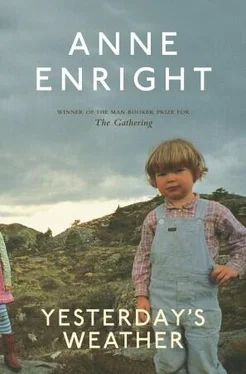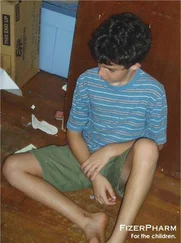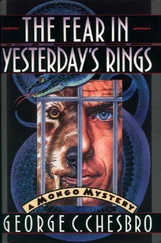When he was a child, he asked what a signature tune was. ‘A signature tune,’ said his father, ‘is a young swan-song — just like you. Would you look at him.’
He searched in the mirror for a clue. But his eyes just looked like his own eyes, there was no word for them, like ‘happy’ or ‘sad’.
‘Why don’t cabbages have nerves?’
‘A good question.’ His father believed in the good question, though the answer was a free-for-all.
If he was asked where his grief began, or what he was grieving for, he would look surprised. Grief was this house, the leaking petrol pump, the way his mother smiled. He moved through grief. It was not his own.
He read poetry in secret and thought his mind was about to break. Sunset fell like a rope to his neck. The Señorita slid at her own pace past the man and the bull and nothing he could do would make her change.
‘Come and do the hedges on Wednesday afternoon,’ said a woman, as he handed her keys back through the window. Then she swept off through the hedges with the exhaust like an insult. The car had been full of expensive smells, plastic and perfume, hairspray, the sun on the dashboard. The lines around her eyes were shiny and soft with cream. Her skin reminded him of the rice-paper around expensive sweets, when you wet it in your mouth.
He rehearsed in his room until he was ready, then came and did the work. He hated her for her laugh at the door. ‘It’s only money,’ she said, ‘it won’t bite.’
In years to come he would claim an ideal childhood, full of fresh air and dignity, the smell of cooking, rosehips and devil’s bread in the ditch. On a Saturday night his sisters would fight by the mirror by the door and talk him into a rage, for the fun.
‘The place was full of secrets. You wouldn’t believe the secrets, the lack of shame that people had. Children that were slow, or uncles that never took their hands out of their trousers, sitting in their own dirt, money under the bed, forgetting how to talk anymore. It wasn’t that they didn’t care, filth was only filth after all. It was the way they took it as their own. There was no modesty behind a closed door, no difference, no meaning.’
To tell the truth, he did not go back for the money, although he knew the difference between a pound note and nothing at all. His pride drove him back, and the words of the man under the hat in his room. ‘Give her what she wants.’
There was a small girl playing football on the grass, just to annoy. They knew each other from school. ‘Your father is a disgrace,’ she said in a grown-up voice. ‘A disgrace, in that old jacket.’ Then she checked the house for her mother and ran away. The woman sat knitting in the sun and watched him through the afternoon. Her back was straight and hands fast. She kept the window open, as if the smell of chicken slurry was fresh air.
She touched him most by her silence. The kitchen was clean and foreign, the hill behind it waiting to be cleared of thorns and muck. It was the kind of house that was never finished, that the fields did not want. It sat on a concrete ledge, like a Christmas cake floating out to sea.
He liked the precision of things, the logic of their place, the way the cups made an effort as they sat on the shelf. There were some strays, here and there, an Infant of Prague forgotten on the back of the cooker, a deflated football wedged behind the fridge. The cistern from an old toilet was balanced against the back wall, although the bowl was gone.
Waiting for his cup of tea, he forgot what it was he had come for. She was ordinary at the sink, ordinary and sad as she took out the sugar and the milk. When she sat down in her chair at the far side of the room, she was old and looked impatient of the noise his spoon made against the cup.
She asked after his mother, and turned on the radio and said he made a good job of cutting the lawn with the grass still damp. They listened to the tail-end of the news and she took a tin down from the cupboard. ‘I suppose I can trust you,’ she said grimly as she opened it up and a swirl of pound notes was seen, like something naked and soft. There was music on the radio.
He fought for the pictures in his room, of a man with a hat, who casually takes her by the wrist and opens out the flat of her palm, as if he understood it. He thought of the taste of rice-paper melting on his tongue, of the things she might wear under her dress. He struggled for the order of things that might happen if he held his breath. She gave him an indifferent smile. He did not understand.
‘Women,’ said his father, ‘torture us with contradiction, but just because they enjoy it, doesn’t mean that it’s not true.’
There was a soft scratching at the door, and the two of them froze as though caught, with the money trapped in the woman’s hand. When it opened he saw an old, fat crone who would not cross the threshold. Her shape was all one, he couldn’t tell where one bit ended and the next began. There was a used tissue caught in the palm of her hand. She had a shy face. ‘Monica, is the creamery cart come?’ ‘Yes,’ said the woman in a loud voice. ‘It’s a tanker, not a cart.’ ‘Oh no,’ said the old woman, ‘I’m fine, don’t worry about me.’ She closed the door on herself without turning away.
Her name was Monica. She smiled at him, in complicity and shame. ‘Deaf as a post,’ she said, and the room dilated with the possibilities in her voice. She was embarrassed by the money in her hand. She looked at the bob of panic in his throat.
‘There was a woman lived up the way from us, the kind that had all the young fellas in a knot. You could tell she wanted something, though probably not from you. She was ambitious, that was the word. It wasn’t just sex that gave her that look — like she knew more than you ever could. That she might tell you, if she thought you were up to it. She had an old husband in the house with her, and a mother, senile, deaf, who pottered around and got in the way. And one day the old woman died.
‘My father came in from the removal, rubbing his hands. He was a mild kind of man. “Sic transit,” he said. “Sic, sic, sic.” He took off the old coat with a kind of ceremony. I remember him taking the rosary beads out of his pocket and putting them beside the liquidiser, which was their place. I remember how ashamed I was of him, the patches on his coat and the beads and the useless Latin. When he sat down he said “How the mighty,” and I felt like hitting him.
‘When someone died, this woman Maureen would wash the body, which was no big deal. She might take any basin they had in the house and a cloth — maybe the one they used for the dishes. I don’t know if she got paid, maybe it was just her place.
‘“The secrets of the dead,” said Da, “and the house smelling of fresh paint. Oh but that’s not all.” He told me one of those country stories that I never want to hear; stories that take their time, and have a taste to them. Stories that wait for the tea to draw and are held over when he can’t find the biscuits. “Do you know her?” he said, and I said I did. “A fine woman all the same, with a lovely pair of eyes in her head. As I remember.” He remembered the mother too of course and what kind of eyes she had in her head, as opposed to anywhere else.
‘It was the son-in-law broke the news that the old woman had died, and when Maureen came to lay out the corpse, she found the man in the kitchen reading a newspaper and the wife saying nothing, not even crying. She offered her condolences, and got no sign or reply. There was no priest in the house. So Maureen just quietly ducked her head down, filled a basin at the sink, tiptoed her way across the lino with the water threatening to spill. When she got to the door of the old woman’s room the wife suddenly lifted her head and said “You’ll have a cup of tea, Maureen, before you start.”
Читать дальше












